Photo Credits – Journalist Raqib Hameed Naik
This photo essay has been curated by Foundation the London Story for its bi-monthly bulletin, ‘The London Eye’, Issue 1 (Aug-Sept 2021). A seven-part photo essay was originally published on TwoCircles.net in 2016.
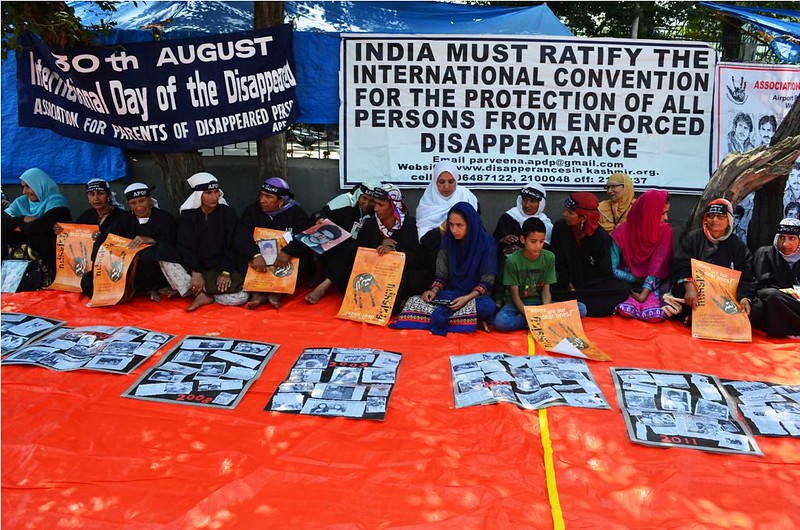
In the heavily militarised zone of Kashmir, on every 10th of the month, a group of mothers, wives, and family members of disappeared persons in Kashmir organize a sit-in to protest against the enforced disappearances of their sons and husbands. According to estimates, there have been 8,000-10,000 cases of enforced disappearance in Kashmir since 1989.
Association of Parents of Disappeared Persons (APDP) has been protesting against the excessive power of preventive detention, arrest, search, seizure, and power to shoot to kill on suspicion, use of lethal force, granted to Indian Security Forces under draconian laws like the Public Safety Act, Disturbed Areas Act, and the Armed Forces Special Powers Act.
APDP campaigns for an end to the practice and crime of involuntary and enforced disappearances at local, national, and international platforms. It documents the cases of enforced disappearances in Kashmir, mobilizes students, activists, and professionals, provides medical and other essentials to the kin of disappeared persons, and demands India to ratify the International Convention for Protection of All Persons from Enforced Disappearances.
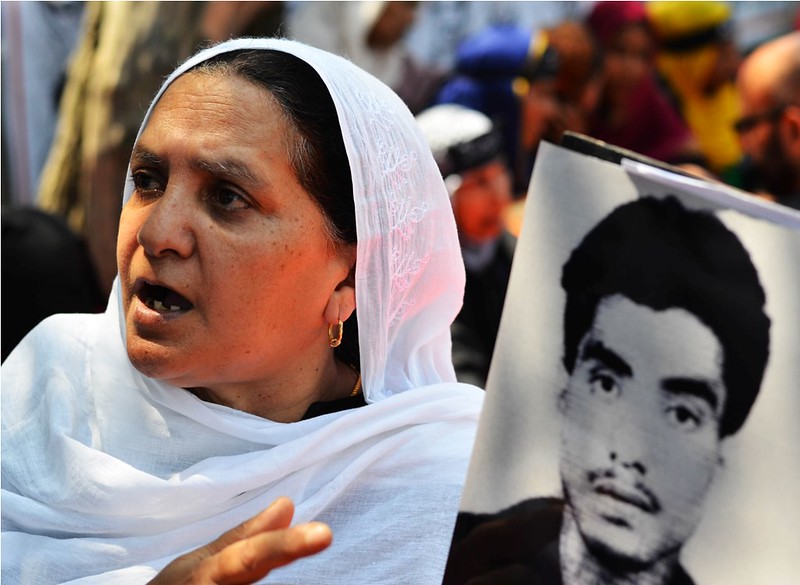
APDP was started by Parveena Ahangar, a mother whose 16-year-son was picked up by security forces in 1990. Her son has been missing since. It was her attempt to bring together families of disappeared persons from different parts of Jammu and Kashmir. Despite not receiving any formal education, through APDP she has brought global attention to the issue of enforced disappearance in Kashmir.
Parveena’s son ‘Javaid’ Ahangar was picked up and taken to an unknown location by Security Forces after confusing him with militant ‘Javed’ Ahmed Bhat. In search of her son, Parveena went to all nearby hospitals, jails, and torture centres but returned empty-handed. She organized a huge protest in front of the Police Control Room in Srinagar. In response to the protest, the then Superintendent of Police told her to “go and file a case in court”.
In 1991, Parveena moved to court which lead to an inquiry in the case, and it was proved that three Army officers had picked up her son. She fought her case legally till 1997 and the case file was sent to Union Home Ministry for sanction to prosecute the accused Army officers. However, the prosecution never went through. To date, Parveena doesn’t know if her son is dead or alive. She lost her faith in the judicial process and formed the APDP in order to help other mothers like her. For her efforts, she was nominated for the Nobel Peace Prize in 2005.
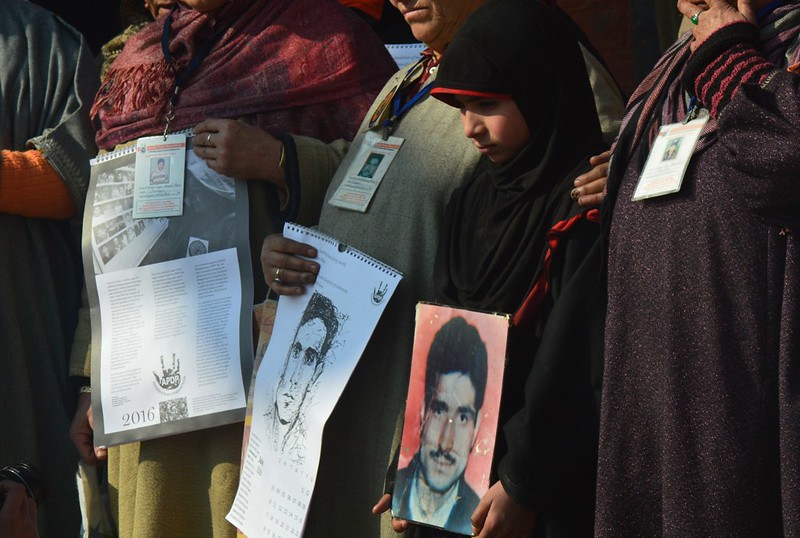
The disappearances which continued unabated during the 1990s created a sub-group of widows who were called ‘Half Widows,’ a term for women who did not know whether their husbands were dead or alive. An estimated 2,000 half widows live in Kashmir, without any legal recognition or assistance from the State.
In Jammu and Kashmir, while widows are eligible for some compensation under civil law, a half widow couldn’t lay claim to compensation. For that, she had to produce the death certificate of her husband, which she couldn’t because, well, she didn’t know whether he is dead or alive.
According to APDP data, many half widows and their children are deserted by their in-laws and are not given any property rights. These half widows are also not given any aid to raise their children. They often resort to working as laborers and do odd jobs in factories, offices, and shops. They also suffer from Post-Traumatic Stress Disorder.
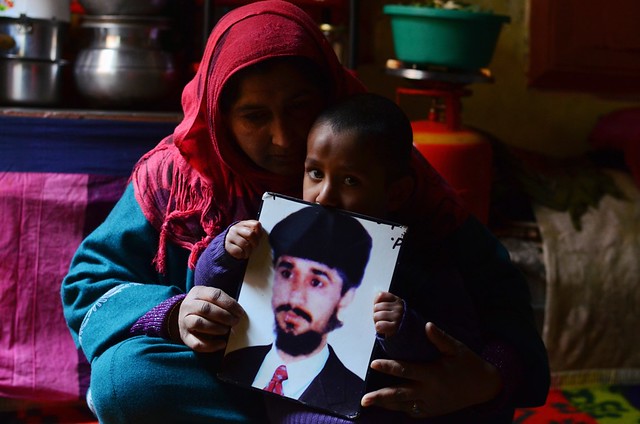
The wife of ex-Jammu Kashmir Liberation Front member, Naseema Begum and her son await the return of Mehraj-ud-din. After leaving behind his past as an ex-militant, Mehraj had opened a shoe shop. On the night of April 19, 1997, when he was sleeping with his family, Army men crashed through his door and took Mehraj into another room. He was then asked “Samaan kahaan hain? (Where is the ammunition)”. As Mehraj replied in negative to their repeated inquiries, the Army men called his father and asked him for hot water and chilli powder to be used in torturing him. The torture went on unabated for two hours and Mehraj was then taken away by the Army men.
Even after repeated rounds to the Army base camp, Mehraj’s enforced disappearance was not acknowledged by the Army. In 2000, Mehraj’s case went to State Human Rights Commission and after six years, the commission directed the government to pay Rs 1 Lakh to the victim’s family and a government job. But the family denied this compensation because they wanted Mehraj back, and rightfully so.
Thrown out by her in-laws, Naseema and her two kids have only one request: if he is alive hand him over to us. If he is in jail, let us speak with him. If he is dead, show us his grave.
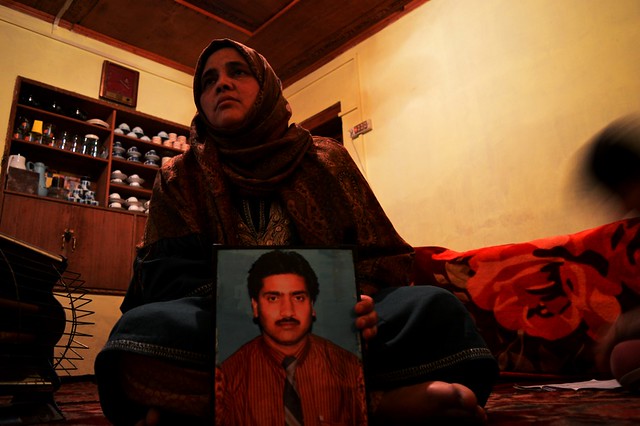
Himayoun Azad was on the way to meet his sister in a nearby town. He was stopped by soldiers of the 137th Battalion of the Border Security Force (BSF) and was asked for his identity. On examining his identity card, the guards dragged him out of the car, claiming they had prior information about his travel. The BSF soldiers bundled him into their vehicle and took him straight to their camp which was then located near New Convent school, Rajbagh.
Himayoun’s mother was allowed to see him in detention, later that day. She saw that He had been severely tortured and couldn’t stand. After being taken to the camp, where he was tortured, he had been brought back by the forces to his house. The BSF personnel then searched every corner of the house but found no ammunition. They took away one lakh rupees meant for the family’s business investment. That was the last time Himayoun family saw him.
The family fought Himayoun’s case legally till 1996 but was unable to pursue it further as Himayoun’s mother fell seriously ill. Unable to cope with the loss of her son, she died due to cancer in 1999. Today, his wife and his kids are trying to make their ends meet. In the 2014 floods, she lost all her possessions to the floods and had to start all over again.
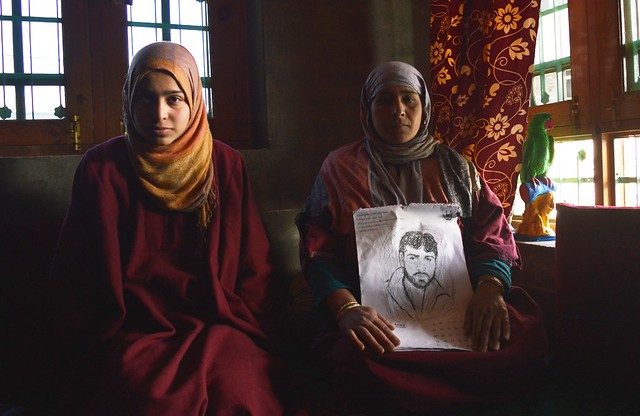
Another half-widow whose husband was captured and detained by Security Forces in 1997, Rafiqa’s case highlights the lack of accountability and assistance.
A decade after her husband’s disappearance, Rafiqa was paid an ex-gratia amount of Rs 1 lakh and a promise of the lowest rank of non-gazetted job for her son under the Statutory Regulatory Order (SRO) 43 notified by the J&K government in 1994. However, these turned out to be fake promises. These cases are screened by district screening-cum-coordination committees (DSCCC) constituted at the district level by the government. The amount has to be refunded back if the victim turns out to be alive. “Rs 1 lakh was a big prank played on us. The government divides the amount into many parts. One part is paid to the parents of victims, some part is kept fixed in a bank account for children and the remaining is left for the wife. Rafiqa’s son was never even given a job.
Like other ‘half widows’, every month on the 10th, Rafiqa travels 10 km from her home in Mahrajapur, Batamaloo to Pratap Park near Lal Chowk to take part in the silent sit-in with relatives of the other missing persons. APDP and Parveena Ahangar have been a constant support to her.
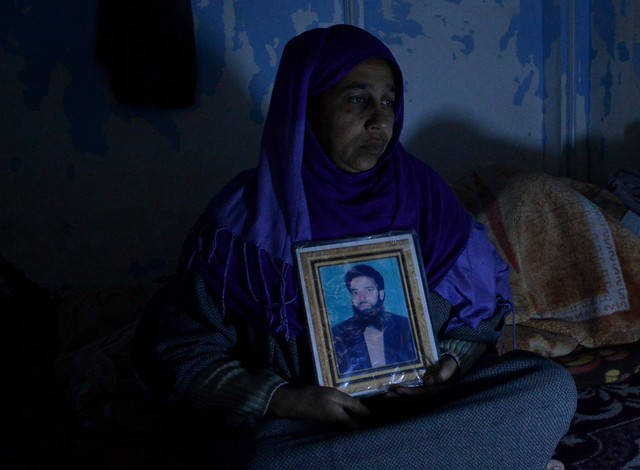
Not very different from other cases, Shabnum Wani’s experience with the Security Forces shows how power granted to these Security Forces under draconian legislations is being constantly abused. After her husband’s disappearance in 1997, when Shabnum went to look for him in Army camps, the authorities always used delaying tactics, never allowing Shabnum to meet Abdul.
After Shabnum’s repeated visits, a frustrated Army Captain told her that her husband was not there and if she comes back to the camp once more, the Captain would come to her house one night and kill her and her family members.
Shabnum filed a case in court and was asked to file an FIR seven years after her husband’s disappearance. Due to the ill health of her mother-in-law, Shabnum had to attend to her in Delhi and thus was unable to visit the court in Srinagar. Ultimately, the case did not go ahead. Now, Shabnum joins other women and APDP for the monthly sit-in protests.
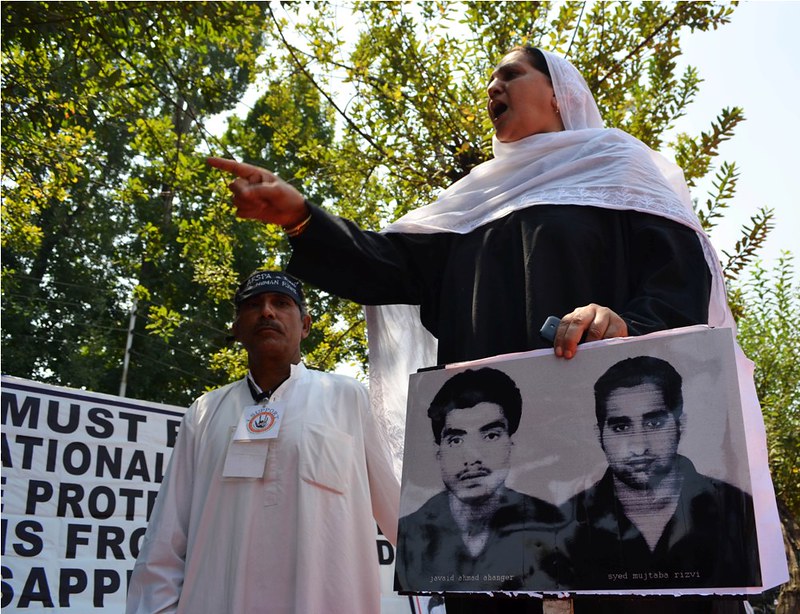
On 20th October 2020, APDP’s office was raided by the National Investigation Authority (NIA), Criminal Investigation Department (CID), and the Jammu and Kashmir Police, accompanied by Central Reserve Police Force (CRPF). The team examined all documents relating to APDP’s work. They subsequently seized several documents and some electronic devices. Praveena Ahanagar’s mobile phones were also seized. During the raid, sensitive data about the victims and their families were seized by the authorities. APDP has clarified that it has never received any foreign funding and only uses the UN Voluntary Fund for Victims of Torture funding. Ever since the raid, APDP’s website and social media have not been updated. Their advocacy work has taken a backseat.
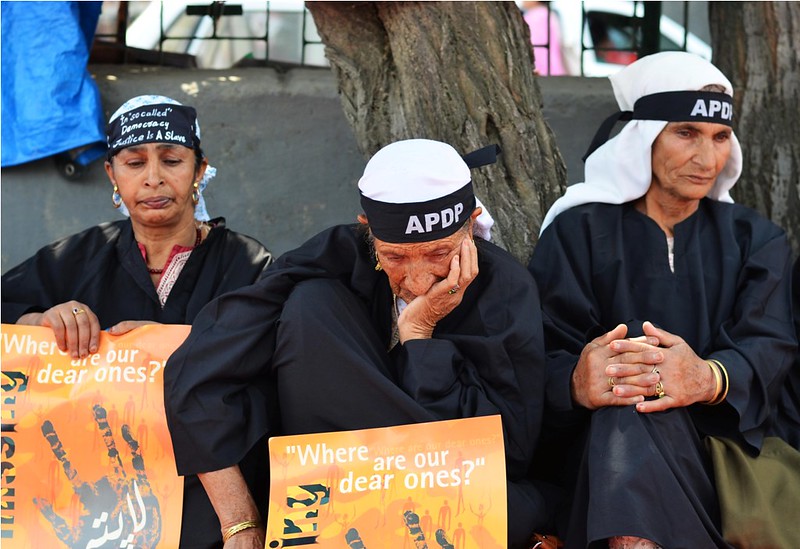
The International Convention for the Protection of All Persons from Enforced Disappearance (ICPPED) was adopted by General Assembly resolution A/RES/61/177 in December 2006 and came into force on 23 December 2010. India became a signatory to the Convention on 06 Feb 2007. However, since then the country has neither engaged with the convention nor ratified it. This comes in the light of several states in India witnessing Police brutality and administrative impunity. It was estimated by APDP in 2011 that between 8,000 to 10,000 people were abducted by the state authorities in Kashmir. Ensaaf – NGO functioning in the state of Punjab have recorded over 20,000 enforced disappearances in the region between 1985 and 1990.
At Foundation TLS we are also concerned about the state impunity, potential enforced disappearance, and detention of people in the State of Assam in the North East of India. Having been removed from the protective precinct of the law and “disappeared” from society, victims of enforced disappearance are deprived of all their rights and are at the mercy of their captors. Forced disappearance is the gravest of the Human Rights violation and it is of utmost importance that the Government of the largest democracy in the world takes all appropriate steps to ratify the International Convention for the Protection of All Persons from Enforced Disappearance.
To read more about forced disappearances refer to the UN website: https://www.ohchr.org/en/hrbodies/ced/pages/conventionced.aspx
For learning more about enforced disappearances in India refer to: https://guides.library.duq.edu/disappearedpersons/India
Urge the Government of India to Ratify the International Convention for the Protection of All Persons from Enforced Disappearance.


